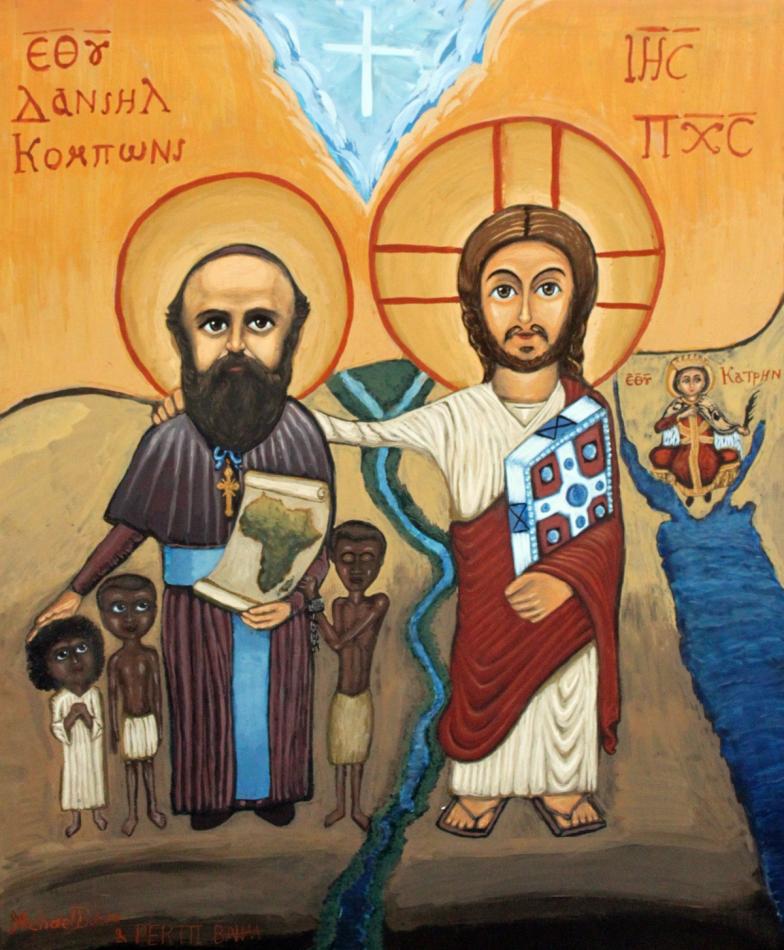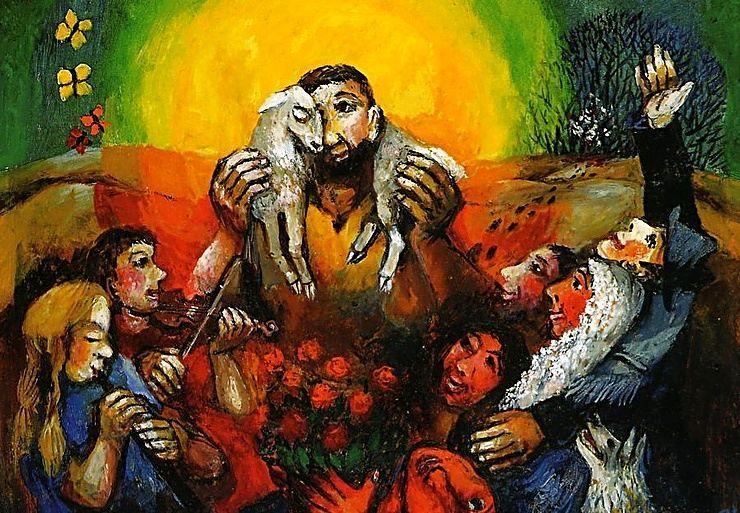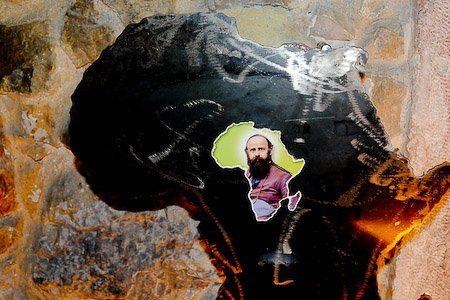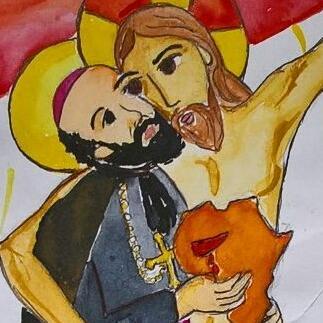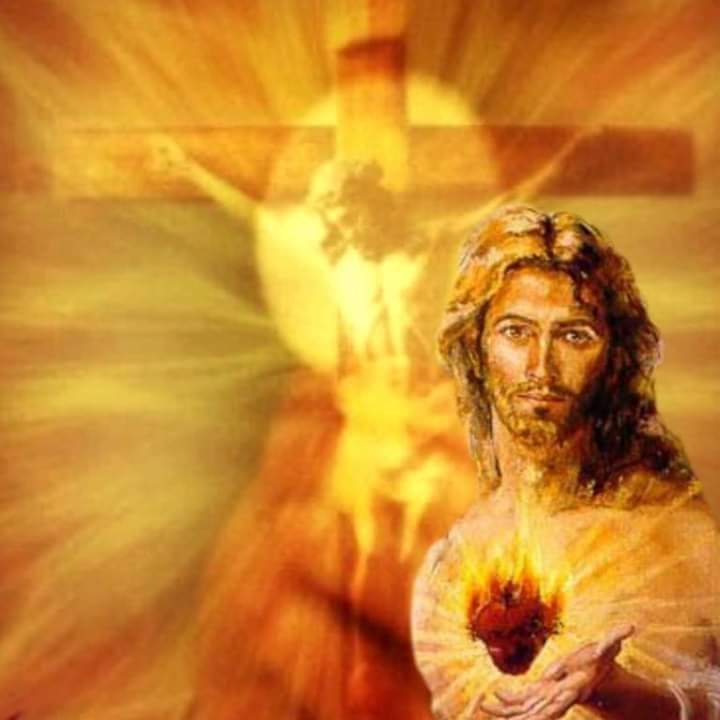Daniel Comboni
Comboni Missionaries
Institutional area
Other links
Newsletter
Sunday, July 4, 2021
The closest Comboni communities get together, whenever possible, to celebrate the great feasts of the Institute, such as that of the Sacred Heart of Jesus, celebrated on Friday 11 June. This is what the Portuguese communities of Maia and Vila Nova de Famalicão had planned, had one of the confreres not tested positive for Covid-19. José da Silva Vieira, a Comboni Missionary waiting to leave for Ethiopia, had the task of guiding the reflection of the day which had to be given online. The reflection, entitled “The Heart’s Triumph”, was also recorded on YouTube.
THE HEART’S TRIUMPH
The devotion to the Sacred Heart of Jesus springs from the account of Jesus' death according to St. John's Gospel, and its solemnity has been celebrated by the universal Church since 1856. It was instituted by Pope Pius IX, the Roman Pontiff with whom Daniel Comboni maintained a very strong relationship.
The great promoters of the devotion were, two centuries earlier, Saint John Eudes (1601-1680), a French priest who wrote the first texts for the liturgical celebration of the Sacred Hearts of Jesus and Mary; and Saint Margaret Mary Alacoque (1647-1690), a nun from the monastery of Paray-le-Monial, in France, to whom Jesus manifested himself for 17 years and asked for a particular devotion to his heart. The Estrela Basilica in Lisbon is the first church dedicated to the Heart of Jesus.
The spirituality of the Sacred Heart of Jesus represents the triumph of the grace´s optimism, promoted by the Jesuits, against Jansenism pessimism. The Michaelis Dictionary defines Jansenism as "the doctrine of Cornelius Jansenius (1585-1638), a Dutch theologian and bishop of Ipres, which denies free will and emphasizes predestination, asserting that man's salvation depends on the will of the creator rather than on his disposition to good works." In a figurative sense it is "severe ethics and austerity, moral and religious, extreme."
The contemplation of the Heart of Christ, more than a devotion, is a spirituality: it marks the will and the living prayed in the aspiration "Jesus meek and humble of heart, make my heart like Yours".
It is a very current and missionary spirituality: contemporary culture, marked by globalized narcissistic individualism, needs a heart to be a culture of life. In the Church, St. Therese of Lisieux wanted to be love. In the world, Christians have to be the heart. Which must beat to the rhythm of Jesus’ beats.
That was the intuition lived by St. Daniel Comboni. He wrote [the Catholic] "was carried away under the impetus of that love set alight by the divine flame on Calvary hill, when it came forth from the side of the Crucified One to embrace the whole human family; he felt his heart beat faster, and a divine power seemed to drive him towards those unknown lands. There he would enclose in his arms in an embrace of peace and of love those unfortunate brothers of his" (Writings 2742).
Pope Francis describes this contemplative journey with his own creative simplicity: "In union with Jesus, we seek what he seeks and we love what he loves" (Evangelii gaudium 267).
I have entitled this reflection "The hearts triumph". I have been inspired by the revelation of the Lady of Fatima to the little shepherds on July 13, 1917: "In the end, my immaculate heart will triumph". Fatima is the message of the triumph of the heart.
I have interpreted this heartfelt victory in the light of the Eastern iconography in which Mary's heart is represented by the Jesus-Child.
The triumph of Mary's heart is the triumph of Jesus’ heart. Indeed, this is also a Comboni intuition: the two hearts "work" together and are triumphant hearts.
Underlining the success of the two sisters who prepared three slave girls for baptism, Daniel Comboni wrote in his Report to the Cologne Society: "In the end, the grace of the Hearts of Jesus and Mary was triumphant" (Writings 5315).
1. MEEK AND HUMBLE HEART
Jesus makes us an irrefutable proposal for a path of holistic and comprehensive well-being: "Come to me, all you who labour and are overburdened, and I will give you rest. Shoulder my yoke and learn from me, for I am gentle and humble in heart, and you will find rest for your souls." (Matthew 11:28-30).
Jesus makes this offer after a brief prayer of praise to the Father, because the little ones, more than the wise and the learned, are capable of welcoming the revelation of God manifested in Him.
This offer of Jesus takes on a giant dimension in the psychotic society in which we live. Jesus makes a concrete offer to the weary and oppressed, eager for rest for their bodies and hearts: he proposes meekness and humility of heart as a remedy for the fatigue and depressions that affect physical and mental health.
In 2018, the Portuguese bought more than 10 million packets of anxiolytics and almost nine million boxes of antidepressants. Portugal is the fifth largest consumer of antidepressants among the 29 countries of the OECD, the Organization for Economic Cooperation and Development.
In a neurotic society like ours, Jesus proposes a natural cure: a meek and humble heart as an answer to the psychoses and depressions that come from the highly competitive culture with no humanizing standards or goals.
Pope Francis very wisely notes that "if we live tense, arrogant before others, we end up tired and exhausted."
And he proposes a way out: "when we look at their limits and defects with gentleness, without feeling superior, we will be able to give them a hand and avoid wasting energy in useless lamentations."
THE STEPS
The offer that Jesus makes to us has five steps:
a) Come to me...
The first step that He proposes to us is to get out of ourselves, out of our comfort zone and of our pains, out of the self to go to Him, out of self-referentiality to the Trinitarian reference, the God-family, the God-love.
The psychiatrist Viktor E. Frankl, notes in Man’s Search for Meaning, his memoir of three years in four Nazi extermination camps: "The more a person forgets himself — by giving himself to a cause or to the love of another person — the more human he becomes and the more effective or actualized he becomes."
b) To recognize fatigue and oppression
Jesus' invitation is to the fatigued and oppressed. In order to accept his invitation it is necessary to become aware of and name the fatigue and oppression that weighs upon us, its causes. Some are personal, some are institutional, some are social and cultural. The first step to healing is to assume the illness.
c) To accept Jesus' rest
Jesus gives us the rest of his love, his grace, his warmth, his peace. We are free to accept it or not.
d) To take His yoke
In the Jewish Scriptures the yoke is the Torah, the Law of the Lord. In Jesus' time the Law was codified into 613 prescriptions: 365 prohibitions (negative commandments) and 248 obligations (positive commandments). A very heavy moral burden on the mind and heart of the devout believer. Jesus summarizes the Law in the threefold love: God, neighbor and self. John, inclusively, says that the love for God is translated into the love for one's neighbor. The yoke of the Lord is the yoke of love.
e) To learn meekness and humility from Him
Jesus says that the remedy for the weariness and oppression that come upon us is found in a meek and humble heart.
Jesus' meekness comes from His humility. The apostle Paul inserts a Christological hymn in his letter to the Christians of Philippi, the city in northern Greece that was the gateway of Christianity into Europe. Rather, he challenges them by way of introduction: "Make your own the mind of Christ Jesus”.
The hymn sings of the process of emptying that Jesus undertook through the mystery of the incarnation: being God, he becomes a servant, man with humans, obedient unto death and death on a cross. For this he is exalted, proclaimed Lord.
The Son, the Word, humbled himself and pitched his tent among us, a pilgrim with pilgrims. He is the GPS of the process of appeasement to meekness.
In the Sermon on the Mount Jesus blesses and congratulates the gentle "they shall have the earth as inheritance" (Matthew 5:4).
To celebrate his heart is to assume humility and meekness, gentleness as ways of life in a world so devoted to individual success, fame, and limitless competition.
2. COMBONI’S MYSTICISM
Daniel Comboni has synthesized the two devotions - of the Sacred Heart of Jesus and of the Good Shepherd - in the Comboni icon of the Pierced Heart of the Good Shepherd, deepened by Fr. Francesco Pierli.
In the pastoral letter for the consecration of the Vicariate to the Sacred Heart that he wrote from El Obeid on August 1, 1873 as apostolic pro-vicar with the pro-secretary Fr. Joseph Franceschini, exclaims: "We are profoundly convinced that […] from the mysterious centre of this divine pierced Heart, torrents of graces and rivers of heavenly blessings will flow upon this great people of Central Africa so beloved by us, still tremendously burdened for so many centuries by the anathema of Ham." (Writings 3330).
Half a dozen years later, in the Report to the Society of Cologne written from Khartoum on February 15, 1879, the holy bishop affirms: "The Sacred Heart of Jesus also beat for the black peoples of Central Africa and Jesus Christ also died for the Africans. Central Africa too will be welcomed into the sheepfold by Jesus Christ, the Good Shepherd, and the apostolic missionary cannot but take the way of the divine Teacher’s Cross, strewn with thorns and all kinds of efforts. […] Thus the true apostle cannot fear any difficulty, nor even death. The Cross and martyrdom are his triumph" (Writings 5647).
These two paragraphs serve as theological framework to understand the mysticism that Comboni lived and proposes to us "keeping their eyes fixed on Jesus Christ, loving him tenderly and seeking always to understand more fully the meaning of a God who died on the cross for the salvation of souls. " — as he wrote in the famous Chapter X on Norms and directives intended to develop the spirit and virtues of the students of the Institute in the Rules of 1871 (Writings 2721).
We are all pastors, ministering to others. Being pastors according to the Heart of God means contemplating the Crucified One in the crucified ones of society — the discarded, the impoverished, the poorest and most abandoned — loving Him tenderly through ministerial service to these icons, the real presence of the Lord who continues to suffer and die in the crosses of shameful poverty, unemployment, xenophobia, racism, domestic and sexual violence, exploitation of illegal immigrants, loneliness, sickness, death before time.
We can shepherd through the moral imperative, fighting evil with morality, trying to control the essential choices of the people we work with, sometimes with manipulative speeches. It is an option that can lead to moralism as a means of missionary service and the consequent distancing from "sinners" because we think we inhabit a higher level. This was the temptation of the Pharisees.
Contemplating the open Heart of the Good Shepherd we also learn to be shepherds through the wounds of the people entrusted to us, their personal and social sin. Do we allow our hearts to be pierced by the sword of the pains of those we care for?
Old Simeon prophesied to Mary, the mother of Jesus: "a sword will pierce your soul" (Luke 2:35). This oracle can serve as an inspiration to us: in our relationship with people we can either let ourselves be pierced by their pain so that they can be healed by our wounds — as Jesus healed us by his and kept them as a sign of triumph and resurrection — or we can fall into the temptation of moralism (which we usually apply especially to others).
Karl Rahner writes in The Christian of the Future that the Christian of the 21st century will either be a mystic or he will not be a Christian. He defines mysticism as "an authentic experience of God that springs from within existence”.
The same applies to us: the missionary of the 21st century is either a mystic or he is not a missionary. The missionary disciple is the one who stays with the Master to learn from him and is sent to facilitate the experience of the Trinity’s tender and merciful love to those who hunger and thirst for God.
Basically, this is the evangelizing dynamism that John advocates in the prologue to his first letter: "Something which has existed since the beginning, which we have heard, which we have seen with our own eyes, which we have watched and touched with our own hands, the Word of life — this is our theme. That life was made visible; we saw it and are giving our testimony, declaring to you the eternal life, which was present to the Father and has been revealed to us. We are declaring to you what we have seen and heard, so that you too may share our life. Our life is shared with the Father and with his Son Jesus Christ. We are writing this to you so that our joy may be complete.”
Contemplation is a good therapy for the arrhythmias of the missionary heart. The grammar of contemplation is conjugated with hearing, seeing, touching the Word of Life in the Scriptures, in the sacraments, and in everyday life. Only in this way can we synchronize our hearts with Christ's to beat together for the same people. Only in this way are we shepherds according to the Heart of God who lead the Lord's flock wisely and discretely (Jeremiah 3:15).
The image that illustrates this reflection is an icon used by the Comboni Missionaries in Egypt in their missionary animation activities. It was inspired by the so-called icon of friendship or of the embrace, a Coptic work from the VI century that is now exhibited in the Louvre Museum to commemorate St. Menas "who bore good witness to the Saviour".
The friendship, the hug that Comboni receives from Jesus, is the friendship and the hug for the Africans. The contemplation of the Pierced Heart of the Good Shepherd leads us to the same dynamism: to give of what we have received, to speak of what we know, to witness to what we have lived. Paul is clear: "we, too, believe and therefore we, too, speak," (2 Corinthians 4:13).
Pope Francis reminds us that "mission is at once a passion for Jesus and a passion for his people " (Evangelii gaudium, 268).
The tense and intense dialogue between the risen Lord and Peter at the appearance by the Sea of Tiberias illustrates the dynamics of this passion (John 21:15-19).
Jesus renews the invitation to Simon, son of John, to follow after asking him "Do you love me?" (twice) and "Are you my friend?" (once). Peter repeats three times, "Yes, Lord, You know that I am your friend." Each time Peter confesses his friendship for Jesus, he receives the vocational imperative "feed my lambs", “look after my sheep", "feed my sheep".
We Comboni Missionaries are witnesses of the love of the Blessed Trinity through the friendly relationship with the Risen Lord lived in community life. Only in this way we gain the resilience to be faithful to our vocation as witnesses of the merciful love of God expressed by Jesus through His life and His paschal mystery, through the heart pierced by the lance and through our sorrows.
3. HEART: MISSION TERRITORY
Until Evangelii nuntiandi the mission ad gentes has a very strong geographical identity. The physical ad gentes is the scope of the mission.
Saint John Paul II, in Redemptoris missio, writes that there is "one single mission, the same everywhere." (32) and "the mission ad gentes knows no boundaries. Still, it is possible to determine certain parameters within which that mission is exercised, in order to gain a real grasp of the situation" (37).
The parameters that the Polish Pope introduces are (a) territorial; (b) new social worlds and phenomena — which include big cities, youth, emigrants and refugees, and situations of poverty; and (c) the new areopagi of cultural sectors — where media, JPIC issues, and the worlds of culture, scientific research and international relations stand out.
On the other hand, he wrote in Christifideles laici, the apostolic exhortation on the vocation and mission of the laity in the church and in the world of December 1988, that "Humanity is loved by God! This very simple yet profound proclamation is owed to humanity by the Church. Each Christian's words and life must make this proclamation resound: God loves you, Christ came for you, Christ is for you ‘the Way, the Truth and the Life!,” (34).
This synthesis revolutionizes the content of the proclamation: it moves from the kerygma (Jesus was born, lived and died for us, the Father raised him from the dead, and whoever believes in him and is converted has eternal life) to the fontal love: God loves you.
In the same vein, Pope Francis wrote in Evangelii gaudium: "Today, as the Church seeks to experience a profound missionary renewal, there is a kind of preaching which falls to each of us as a daily responsibility. It has to do with bringing the Gospel to the people we meet, whether they be our neighbours or complete strangers. This is the informal preaching which takes place in the middle of a conversation, something along the lines of what a missionary does when visiting a home. Being a disciple means being constantly ready to bring the love of Jesus to others, and this can happen unexpectedly and in any place: on the street, in a city square, during work, on a journey" (127).
The proclamation of love is above all a dialogue of hearts. That is why the Portuguese Bishops' Conference recalled in the pastoral note Todos, tudo e sempre em Missão — All people, all things and always in mission — announcing the Missionary Year 2018-2019 that the heart is, in fact, more than geography, the territory of mission.
"From the encounter with the Person of Jesus Christ is born Mission that is not based on ideas or territories, but 'starts from the heart' and addresses the heart, since it is 'hearts that are the true recipients of the missionary activity of the People of God'", the bishops write in No. 7.
Pope Francis goes along the same lines when he notes in his Message for World Communications Day 2021 that "he Good News of the Gospel spread throughout the world as a result of person-to-person, heart-to-heart encounters with men and women who accepted the invitation to “come and see”, and were struck by the “surplus” of humanity that shone through the gaze, the speech and the gestures of those who bore witness to Jesus Christ."
The Japanese Catholic writer Shusaku Endo, in his novel Silence, recreates some letters of Fr. Sebastião Rodrigues supposedly written from Macau in 1640 while the Portuguese Jesuit anxiously awaits, with a colleague, the boat that will take them clandestinely to Japan to help Catholics barbarously persecuted by the authorities and find out what really happened to Fr. Cristóvão Ferreira, their former formator, that was said to have apostatized. The work is a veritable treatise on missiology.
In the first letter, the Portuguese missionary writes: "Five days later and the time for departure will sound. We will take no other baggage to Japan but our hearts”.
Being territory of mission, the heart is also the means of evangelization. To contemplate the Good Shepherd of the Pierced Heart is to learn from him to love until the end, until consummation. Above all, we must learn compassion, to be moved to the core, that "flipping" — as Bishop António Couto proposes — which was Jesus' visceral reaction to the evils that afflicted his listeners.
Jesus Christ is not an idea, he is a love that is lived and shared. In biblical anthropology we think with our hearts and love with our guts. To be missionaries with heart we have to move from reason to heart. We are rationalists by (de)formation and often try to camouflage our feelings.
To be missionaries with heart we have to lose the fear of the risk of loving and being loved. I fully understood the power of the expression God loves me when I experienced a reciprocal love.
Pope Francis has made tenderness the fourth theological virtue. We have to develop the right hemisphere of our brain to be more affective instead of wanting to be more effective.
Francis writes in Laudato Si' that we must "hear both the cry of the earth and the cry of the poor" (49).
This holistic listening makes us missionaries of integral ecology. Our ancestors deforested and hunted out of necessity — some did it for the dubious pleasure of killing. Today, we are called to care for our common home and all its inhabitants through more sober and sustainable lives, reducing consumption and increasing recycling and waste separation.
The Vatican launched in late May the Laudato si' Action Platform with a seven-year journey to update the implementation of the encyclical that turned five years old.
It says, "The adoption of sustainable lifestyles is grounded in the idea of sufficiency, and promoting sobriety in the use of resources and energy. Actions could include reducing waste and recycling, adopting sustainable dietary habits (opting for a more plant-based diet and reducing meat consumption), greater use of public transport, active mobility (walking, cycling), and avoiding single use items (e.g. plastic, etc.)”.
Some concrete missionary gestures: recycle coffee capsules — they are very practical, but also polluting — separating the grounds from plastic or aluminum; buy in bulk (instead of small packages), eat less meat and more pulses...
The mission is a torrent of love from the heart of the Trinity to the heart of the whole Creation through our hearts.
4. HEART: HOUSE OF GOD
Finally, I propose to contemplate the Pierced Heart of the Good Shepherd as an interpretative key for post-modern religiosity, a look toward a future already present.
We start from an undeniable fact: secularization is advancing apace, especially in the northern hemisphere, and religious institutions are losing use and influence. Younger people adhere less to organized forms of religiosity: 27 percent of North Americans and 11 percent of Europeans describe themselves as spiritual but not religious, according to a Pew Institute study.
We are pastoral agents. Are we going towards unemployment? I don't think so! But we need to recycle our missionary service: to move from an institutional and structural approach to mission from the heart through the mystique of encounter. A change of era requires a change in the mission paradigm.
Religion has its etym in religare (to reconnect, to bind, to unite) or relegere (to read again, to revisit). The prefix RE calls for a constant updating of binding or reading.
The spiritual search of the new generations reveals itself through more harmonious lifestyles. Signs of this spiritual quest are ecology, meditation, yoga, retreats, harmony with creation: ecologically sustained lives anchored in vegetarianism and veganism - which is a radical form of the vegetarian way of life. Both are manifestations of an integral compassion for people and animals.
On the other hand, secularization does not kill faith, but purifies it, returns it to its essentials: the cordial relationship with God, with our brothers and sisters, and with nature. It is in the heart that the epicenter of religion is found.
Jesus answered the Pharisee seeking a synthesis of the faith that the essential is to love God with all your heart, with all your soul, with all your mind, and with all your strength, and your neighbor as yourself, quoting from the books of Deuteronomy and Leviticus (Mark 12:29-31). Paul is more radical: "the whole of the Law is summarised in the one commandment: You must love your neighbour as yourself." (Galatians 5:14).
We read in Jeremiah's prophecy, chapter 31, 31-34: "Look, the days are coming, Yahweh declares, when I shall make a new covenant with the House of Israel (and the House of Judah), but not like the covenant I made with their ancestors the day I took them by the hand to bring them out of Egypt, a covenant which they broke, even though I was their Master, Yahweh declares. No, this is the covenant I shall make with the House of Israel when those days have come, Yahweh declares. Within them I shall plant my Law, writing it on their hearts. Then I shall be their God and they will be my people. There will be no further need for everyone to teach neighbour or brother, saying, ‘Learn to know Yahweh!’ No, they will all know me, from the least to the greatest, Yahweh declares, since I shall forgive their guilt and never more call their sin to mind”.
Jeremiah's prophecy announces the passage from an organized religion — the stony, stone-engraved religion of the temple and the priestly, clerical caste — to a cordial relationship with God, tattooed on the heart.
In this new and eternal covenant “there will be no further need for everyone to teach neighbour or brother, saying, ‘Learn to know Yahweh!’ No, they will all know me, from the least to the greatest, Yahweh declares, since I shall forgive their guilt and never more call their sin to mind”, underscores verse 34.
Perhaps this is why the holy city, the new Jerusalem descended from heaven, has no temple: "I could not see any temple in the city since the Lord God Almighty and the Lamb were themselves the temple" (Revelation 21:22).
The tearing from top to bottom of the Temple curtain at the moment when Jesus delivers his spirit to the Father has this same meaning: the mystery of God becomes accessible to everyone! There are neither barriers nor controllers of the divine to mediate the relationship between God and his people.
Paul often speaks of the Christian as the new house of God. "Do you not realise that you are a temple of God with the Spirit of God living in you?" he asks the Corinthian Christians (1 Corinthians 3:16; 6:19). Peter says that we are stones in a spiritual building (1 Peter 2:5).
On the other hand, Jesus tells the Samaritan woman that "the water that I shall give will become a spring of water within, welling up for eternal life" (John 4:14).
This is why Etty Illesum, the young Dutch Jew who was killed in Auschwitz, wrote in her diary: "Inside me there is a very deep well. And inside there is God. Sometimes I can reach there. But more often there are stones and gravel in the well, and then God is buried. Then you have to dig him out.
Pope Francis writes in No. 88 of Fratelli tutti: "In the depths of every heart, love creates bonds and expands existence, for it draws people out of themselves and towards others. Since we were made for love, in each one of us ‘a law of ekstasis’ seems to operate: ‘the lover ‘goes outside’ the self to find a fuller existence in another’. For this reason, ‘man always has to take up the challenge of moving beyond himself’."
It is love that pulls us out of our comfort zone and opens us to God and others, because "God is love," as John keeps repeating in his first letter.
Hence, secularization is promoting the religion of the heart based on a personal, cordial spirituality. It needs to recover the community dimension.
Contemplating the Heart of Christ leads us to be missionaries of heart and with hearts that reveal the Heart of the Blessed Trinity and are a meeting point with the hearts of all men and women, with the great heart of the universe.
FINAL PRAYER
We end this reflection by praying together the ecumenical Christian prayer, the last of the two prayers with which Pope Francis concludes the encyclical Fratelli tutti.
May these words express our desire to live more from the heart:
O God, Trinity of love,
from the profound communion of your divine life,
pour out upon us a torrent of fraternal love.
Grant us the love reflected in the actions of Jesus,
in his family of Nazareth,
and in the early Christian community.
Grant that we Christians may live the Gospel,
discovering Christ in each human being,
recognizing him crucified
in the sufferings of the abandoned
and forgotten of our world,
and risen in each brother or sister
who makes a new start.
Come, Holy Spirit, show us your beauty,
reflected in all the peoples of the earth,
so that we may discover anew
that all are important and all are necessary,
different faces of the one humanity
that God so loves.
Amen.

